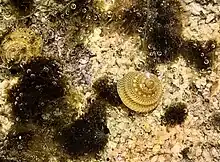Peasiella tantilla
Peasiella tantilla is a species of sea snail, a marine gastropod mollusk in the family Littorinidae, the winkles or periwinkles.[1]
| Peasiella tantilla | |
|---|---|
 | |
| Scientific classification | |
| Domain: | Eukaryota |
| Kingdom: | Animalia |
| Phylum: | Mollusca |
| Class: | Gastropoda |
| Subclass: | Caenogastropoda |
| Order: | Littorinimorpha |
| Family: | Littorinidae |
| Genus: | Peasiella |
| Species: | P. tantilla |
| Binomial name | |
| Peasiella tantilla (Gould, 1849) | |
| Synonyms[1] | |
| |
Description and biology
Peasiella tantilla is five millimeters in length and diameter.[2] The shell of Peasiella tantilla is a spiral shape and its body symmetry is "dextrally coiled".[3] Their shell also extends all the way down to the base and tends to be light brown to yellow.[2] The shell of Peasiella tantilla can also have little white spots on the shell.[2]
Distribution and habitat
Peasiella tantilla reside in the Indo-Pacific.[4] Their marine habitat is the marine benthic[5]. Peasiella tantilla is abundant along the coast of the supratidal region where they are commonly found in pools and are close to the sea.[2] Peasiella tantilla occurs mainly throughout the Pacific Ocean.[2] Examples of places they occur are the Hawaiian Islands, Oceania, Indo-China, and Indo-Malaysia.[6]
References
- Peasiella tantilla (Gould, 1849). Reid, David G. (2009). Peasiella tantilla (Gould, 1849). Accessed through: World Register of Marine Species at http://www.marinespecies.org/aphia.php?p=taxdetails&id=445515 on 6 June 2010 .
- Kay, E. Alison (1979). Hawaiian marine shells. Honolulu, Hawaii: Bishop Museum Press. ISBN 0-910240-26-4. OCLC 5954550.
- "Keeled Periwinkle - Encyclopedia of Life". eol.org. Retrieved 26 February 2023.
- "Peasiella tantilla (Gould, 1849)". www.gbif.org. Retrieved 26 February 2023.
- "Keeled Periwinkle - Encyclopedia of Life". eol.org. Retrieved 26 February 2023.
- "Australian Faunal Directory". biodiversity.org.au. Retrieved 17 April 2023.